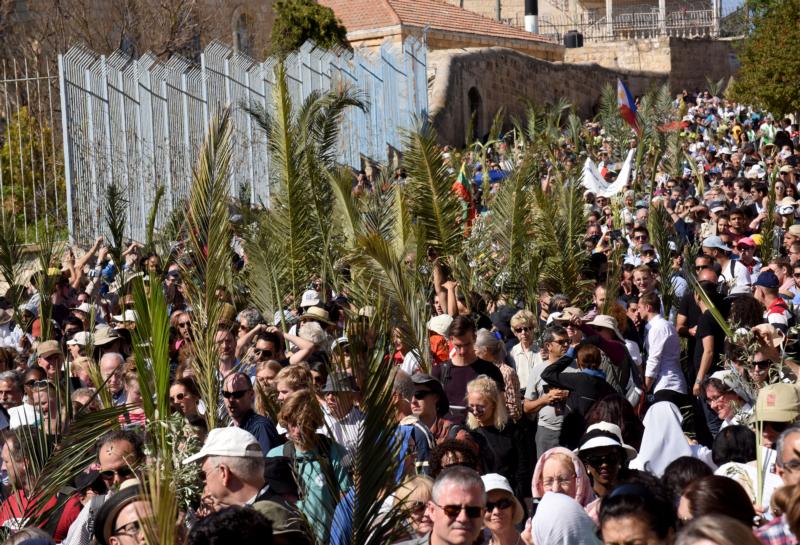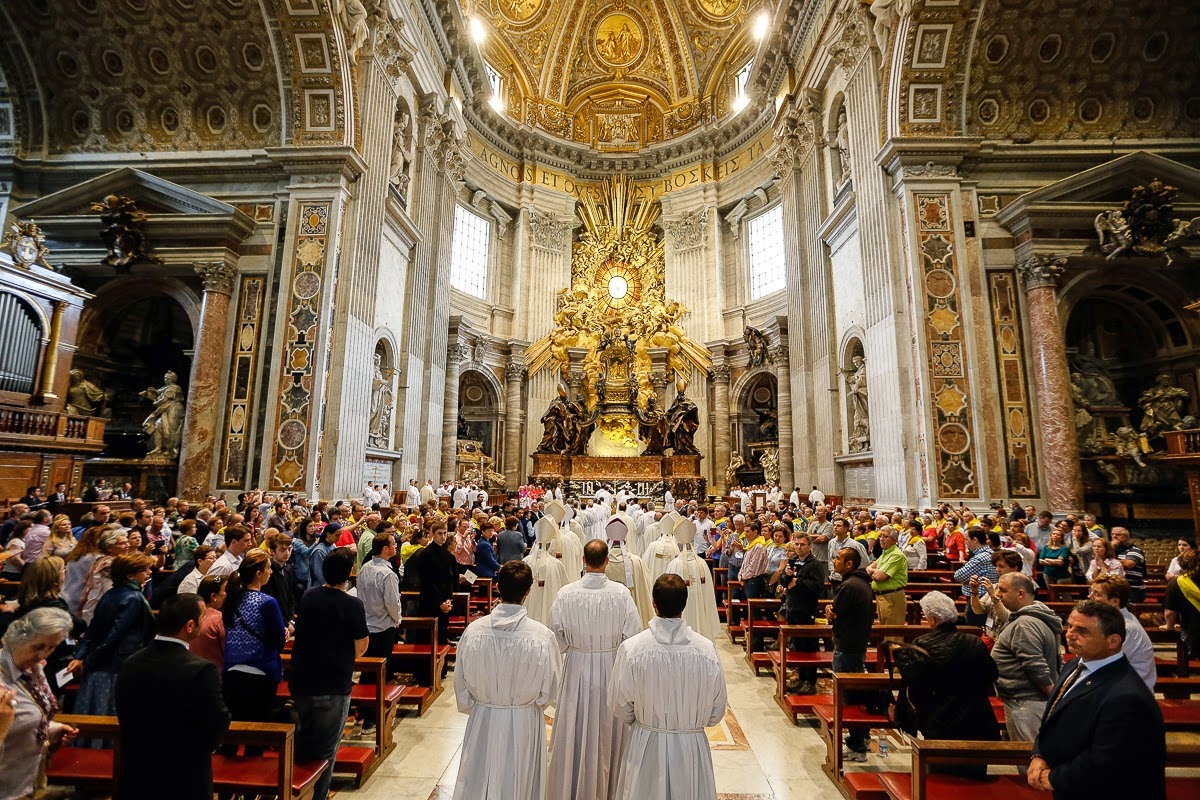
On Palm Sunday the entire Passion of Our Lord is famously read at Mass throughout the world. But today, in the midst of the present crisis it is sure to strike Catholics everywhere with new poignancy – especially when Our Lord before he dies, utters the words of the psalmist,
My God, my God, why have you abandoned me?
After such a glorious entrance into Jerusalem with the children of the Hebrews crying “Hosanna” and “Benedictus qui venit in nomini Domini,” the sudden change in the atmosphere and mood of the Palm Sunday liturgy is always striking. But this year it is admittedly a little melancholic, even from the beginning, because there is no one in the church to even wave the palms.

It is wrong to deny the faithful the opportunity to assist at Mass which is the sacrifice that gives meaning to every sacrifice.
This point is eminently manifest in the beautiful homily for today – Palm Sunday, 5 April 2020 – that a priest (and friend of this blog) has graciously given us permission to reprint here.
Here begins his Homily:
Watch and pray so that you do not enter into temptation.
These words of Jesus to St. Peter in the garden of Gethsemane should stand for us as the watchwords for this crisis into which we have now entered. We must be very clear about this: the pandemic is not just a public health crisis, but has brought to light and intensified the underlying spiritual crisis of humanity in today’s world; the pandemic has brought to light and intensified the crisis of man without God, man who has turned his back on God.
During this time of the pandemic, the use of the word ‘sacrifice’ has become quite common. Everyone is being asked to make sacrifices. Catholics are even being asked to sacrifice attending Mass. For my part, I have been wondering if anyone even knows what they are talking about.
I never read the famous philosopher of selfishness, Ayn Rand, but I recall reading something about her affirming that no human being is worth any ‘sacrifice’. She seems to have seen ‘sacrifice’ as something degrading. Perhaps, as is often the case with falsehoods, she was half right.
I could put the matter this way. It would truly be degrading to sacrifice to another human being (like Caesar for instance), but it is not degrading to sacrifice for another human being. To sacrifice for someone is an act of love.
The real problem we have today is that people speak all the time about sacrificing for someone, but they never speak about sacrificing to anyone or anything. Is that because Ayn Rand was right, or because we have been missing something, something essential, namely that even the sacrifice for someone derives its merit from the sacrifice to someone, but it has to be to the right sacrifice, to the right someone. What and who?
Well, if we consider that Catholics are being asked to sacrifice Mass attendance we might start getting to the root of the problem. Catholics are being asked to sacrifice the Sacrifice, the one true Sacrifice, the only Sacrifice that gives meaning and value to all other sacrifices; Catholics are being asked to sacrifice the Holy Sacrifice of the Mass.
Really? Can the Mass really be that important? Isn’t the essential thing now fighting the pandemic by staying home, staying safe, and supporting the doctors and nurses and other healthcare workers on the front lines?
Don’t get me wrong, the healthcare workers, the truck drivers, the grocery workers, and the others working at ‘essential’ jobs, are indeed important and are putting themselves at risk.

We need to support them and show them our gratitude. Nevertheless, perhaps we are failing to provide them with the most essential support of all.
Now, as we follow the Passion Narrative of Palm Sunday we might consider what an outsider would think about the whole affair. Indeed, there are outsiders present in the Passion Narrative: Pontius Pilate and the Roman soldiers. Actually, Pontius Pilate seems to a bit bored and annoyed by this religious conflict among the barbaric and fanatical Jews. He would rather wash his hands of the affair, wishing it would just go away. The Roman soldiers are bored too, but they think they can at least have a bit of fun. In their fun they show how important they think Jesus is as they put a crown of thorns on his head and proclaim,
Hail, King of the Jews!
It seems that today’s outsiders, the civil authorities, attribute as much importance to the Mass in the fight against the pandemic as Pilate attributed to Jesus Christ.
So, is the Sacrifice of the Mass really so important when it seems we are called upon to make much more urgent sacrifices, like staying at home, for the sake of “flattening the curve”?
As I said, falsehoods often contain an element of the truth. The Aztecs engaged in brutal human sacrifice. They believed that the continuation of the world was dependent on ripping out the hearts of choice human beings and offering them in sacrifice to the god of the sun. Their horrific belief that the sun god needed to sustain his life, and therefore the life of the world, by feeding on human blood is false. Nevertheless, buried in the midst of the falsehood is the truth that the survival of human society is somehow dependent upon sacrifice, but it has to be the right sacrifice.
God does not need our sacrifices, but we are dependent upon God and our relationship with God is dependent upon right sacrifice.
In the Old Testament, in the temple of Jerusalem, besides all the votive sacrifices and prescribed sacrifice for special feasts, there was also the perpetual sacrifice, morning and evening. (cf. Nu 28:3-8) In 586 BC the temple was destroyed. What a catastrophe! The destruction of the Temple and the end of the perpetual sacrifice meant the death of the people.
Nevertheless, the people somehow held together in exile in Babylon and were restored to life again after the exile, when the temple was rebuilt and the perpetual sacrifice was once again offered.
Yet, from that time of exile there came a prophecy of another future destruction. He shall abolish sacrifice and oblation. (Dan 9:27) Later there is reference to a terrible time, a period of about 3 ½ years, that begins when the daily sacrifice is abolished. (Dan 12:11) A terrible prophecy to the mind of the ancient Jew; a prophecy of the end of the world. The same period of 3 ½ years is found again in the Book of Revelation as the expression for the time of the final persecution, the persecution of the Antichrist.
It happened. The Greek King, Antiochus Epiphanes of the Seleucid dynasty, based in present-day Syria, was a figure of the Antichrist. He abolished the sacrifice and profaned the temple in 145 BC. For three years there was no sacrifice until Judas Maccabeus delivered the temple mount, purified the temple and restored the sacrifice. Once again, the sacrifice continued until the destruction of the temple by the Romans in 70 AD.

Nevertheless, some 40 years prior the temple worship had been emptied of its meaning. In the reading of the Lord’s Passion according to St. Matthew this Palm Sunday we hear a statement every bit as disturbing to Jewish ears as the abolition of the sacrifice:
Jesus cried out again in a loud voice, and gave up his spirit. And, behold, the veil of the sanctuary was torn in two from top to bottom.
Jesus’ death effectively brought an end to the temple worship, even if it continued for another 40 years as an empty shell.
Indeed, the Protestants, basing themselves principally on certain passages in the Letter to the Hebrews (cf. Heb 7:26-28; 9:25-28) think that Jesus’ sacrifice brought an end to all offering of sacrifice. For this reason, from their beginning (1517 AD), they have all attacked the whole idea of the Holy Sacrifice of the Mass. This was really the beginning of the secularization of Christianity. This historical process of secularization has led us to the point in which today all religion is viewed as a purely private matter; consequently, from that point of view, there could be nothing wrong with canceling Masses for the good of the public health.
What the Protestants have missed, however, is found in the Passion Narrative of Palm Sunday. At the Last Supper, Jesus took a cup, gave thanks, and gave it to them, saying, “Drink from it all of you, for this is my blood of the covenant, which will be shed on behalf of many for the forgiveness of sins.” This is sacrificial language and even though this took place in the intimacy of the Last Supper, where Jesus was alone with the twelve Apostles, the very mention of “the covenant” speaks of a public reality.
St. Luke gives us important additional information, Jesus’ command to the Apostles, Do this in memory of me. (Lk 22:19) In other words, the same sacrifice that Jesus offered once for all on the Cross, he entrusted to his Apostles to be offered always new in his Church, his Kingdom. This is the public worship of the kingdom of God. That is part of the meaning, at least, of the words that Jesus adds after the offering of the cup: I tell you, from now on I shall not drink this fruit of the vine until the day when I drink it with you new in the kingdom of my Father.
Jesus died once for all, but according to the words of the Letter to the Hebrews, he is our great high priest according to the order of Melchizedek who is always able to save those who approach God through him, since he lives always to make intercession for them. (Heb 7:25)
Sacrifice, in its first and true meaning, which has been forgotten, is the supreme act of the worship of God. When it comes from the heart it is also the supreme act of love of God. The sacrificial worship offered to God, the pleasing sacrifice, is what gives value to all the little sacrifices performed for the benefit of others. Jesus on the Cross offered the one perfect sacrifice that truly pleases God and wins for us the forgiveness of sins and the abundance of grace and divine life.
Sacrifice is the supreme act of the worship of God, but it is above all an act of public worship. We, the public, the people of God, must take part. In that sense, and in that sense only, the sacrifice of the Cross was not sufficient. In that sense the sacrifice of the Cross needs to be offered always anew in every time and place, in fulfillment of the prophecy of Malachi: From the rising of the sun, even to its setting, my name is great among the nations; and everywhere they bring sacrifices to my name, and a pure offering; for great is my name among the nations, says the Lord God of hosts. (Mal 1:11) Through the Holy Sacrifice of the Mass, Jesus’ sacrifice becomes the sacrifice of the Church, our sacrifice, the sacrifice of the new and eternal covenant.

The destruction of the temple means the end of sacrifice and the end of the people. The rebuilding of the temple means the renewal of sacrifice and the resurrection of the people. So, Jesus, after driving the moneychangers from the temple in Jerusalem declared: Destroy this temple and in three days I will raise it up. (Jn 2:19) The evangelist comments: He was speaking about the temple of his body. Therefore, when he was raised from the dead, his disciples remembered that he said this, and they came to believe the scripture and the word Jesus had spoken. (Jn 2:21-22)
The temple of Jesus’ body was destroyed on the Cross, but Jesus ‘rebuilt’ it through his resurrection and continues to ‘build it’ in his mystical Body, the Church. In this temple of his Body, the Holy Sacrifice is continually offered anew.
The Council of Trent taught:
[Jesus] our God and Lord, though He was about to offer Himself once on the altar of the cross unto God the Father, by means of his death, there to operate an eternal redemption; nevertheless … that He might leave, to His own beloved Spouse the Church, a visible sacrifice, such as the nature of man requires, whereby that bloody sacrifice, once to be accomplished on the cross, might be represented, and the memory thereof remain even unto the end of the world, and its salutary virtue be applied to the remission of those sins which we daily commit … He offered up to God the Father His own body and blood under the species of bread and wine; and … He delivered (His own body and blood) to be received by His apostles, whom He then constituted priests of the New Testament; and by those words, Do this in commemoration of me, He commanded them and their successors in the priesthood, to offer (them); even as the Catholic Church has always understood and taught.(Council of Trent, Session XXII, On the Sacrifice of the Mass, Ch. I)
And:
In this divine sacrifice which is performed in the mass, that same Christ is contained and immolated in a bloodless manner, who once offered Himself in a bloody manner on the altar of the cross … the victim is one and the same, the same now offering by the ministry of priests, who then offered Himself on the cross, the manner alone of offering being different. The fruits indeed of which oblation, of that bloody one, to wit, are most plentifully received through this bloodless one; so far is this latter from derogating in any way from that former. (Council of Trent, Session XXII, On the Sacrifice of the Mass, Ch. II)
The well-being of the human world, the well-being of human society, the well-being of human life, as well as our eternal salvation depends upon God. Our connection with God depends on the Holy Sacrifice of the Mass. That is why, in accord with the prophecy of Daniel, the abolition of the sacrifice has always been seen as a sign of the reign of the Antichrist and the coming judgment.
Well, the sacrifice as such has not been abolished, but its public character has been suppressed because the faithful are forbidden to take part.
During this Holy Week, we may well want to cry out with the Psalmist: My God, my God, why have you abandoned me? Yet, as we do so, we want to remember that Jesus himself took these words of the Psalm upon his own lips as he hung upon the Cross.
The abandonment is only apparent as the Psalmist continues – and Jesus knew full well – I will proclaim your name to my brethren; in the midst of the assembly I will praise you: ‘You who fear the Lord, praise him; all you descendants of Jacob, give glory to him; revere him, all you descendants of Israel.
So also in the 54th chapter of the prophet Isaiah, following upon the most vivid prophecy of Christ’s suffering and death (cf. 52:13-53:12), which we will hear on Good Friday, we read:
For a brief moment I abandoned you, but with great tenderness, I will take you back. In an outburst of wrath, for a moment I hid my face from you; but with enduring love I take pity on you, says the Lord, your redeemer.






I will proclaim your name to my brethren; in the midst of the assembly I will praise you: ‘You who fear the Lord, praise him; all you descendants of Jacob, give glory to him; revere him, all you descendants of Israel.
A wonderful and sobering entry. Thank you for pulling it all together—so timely. Blessed Easter to you.